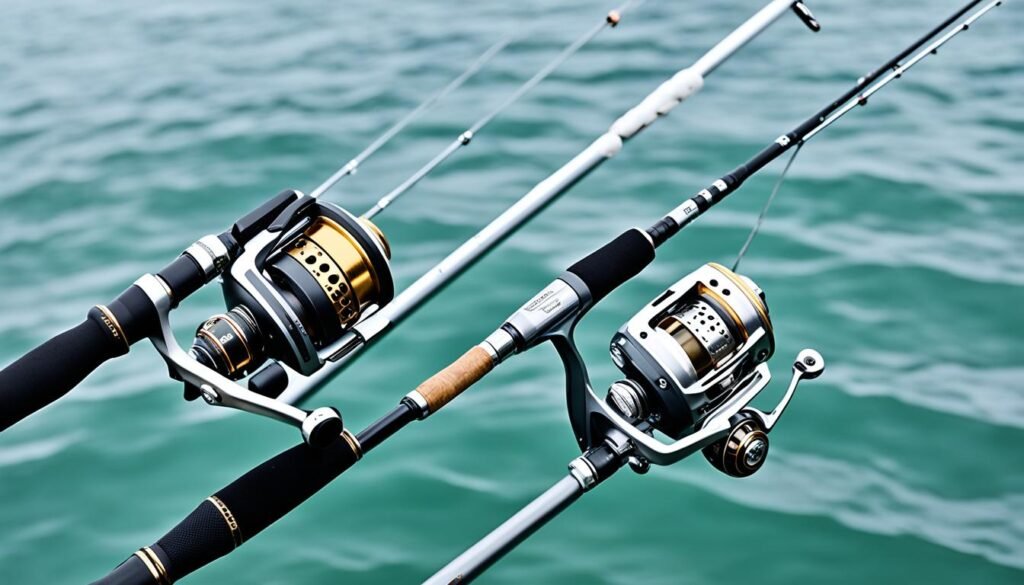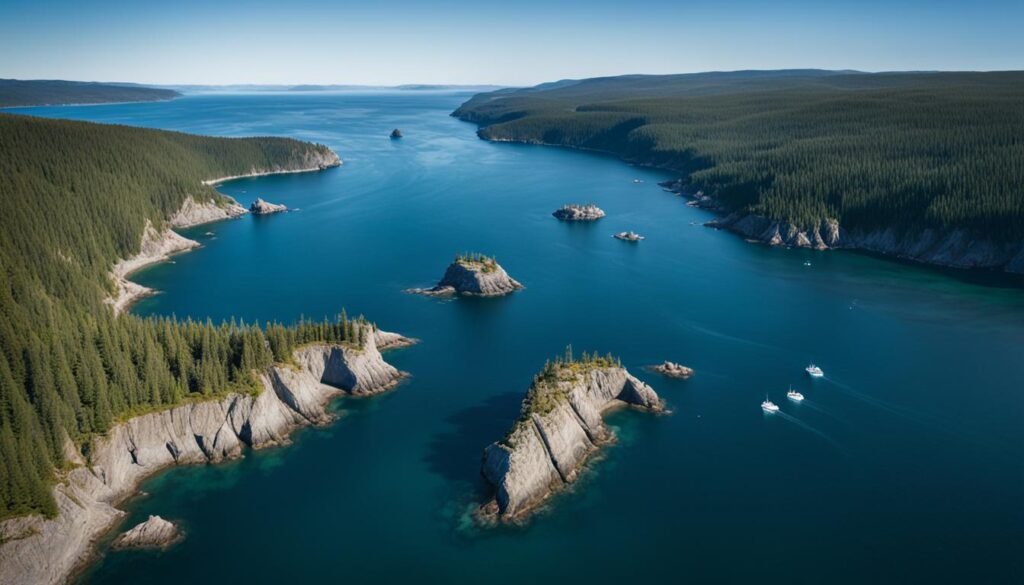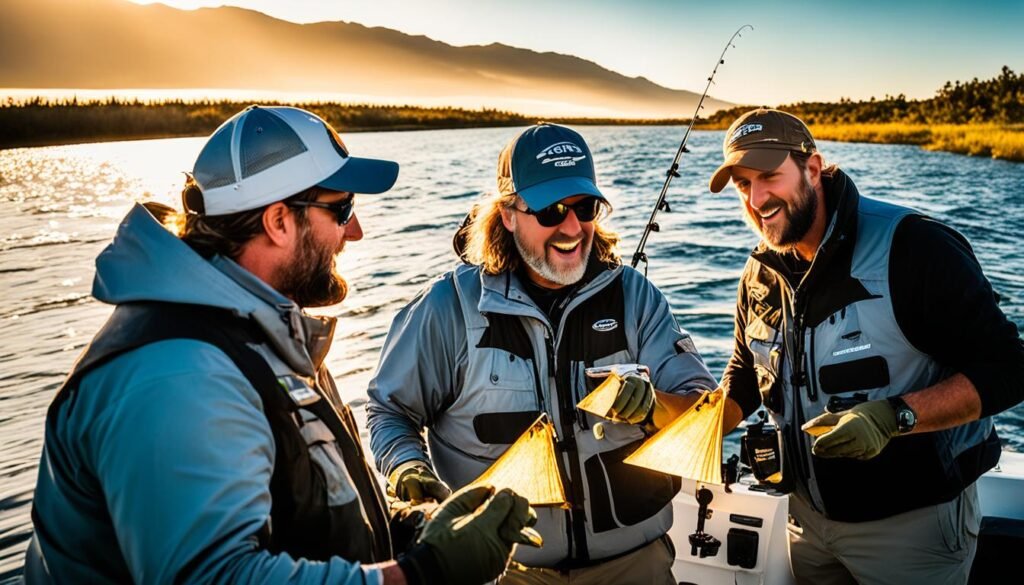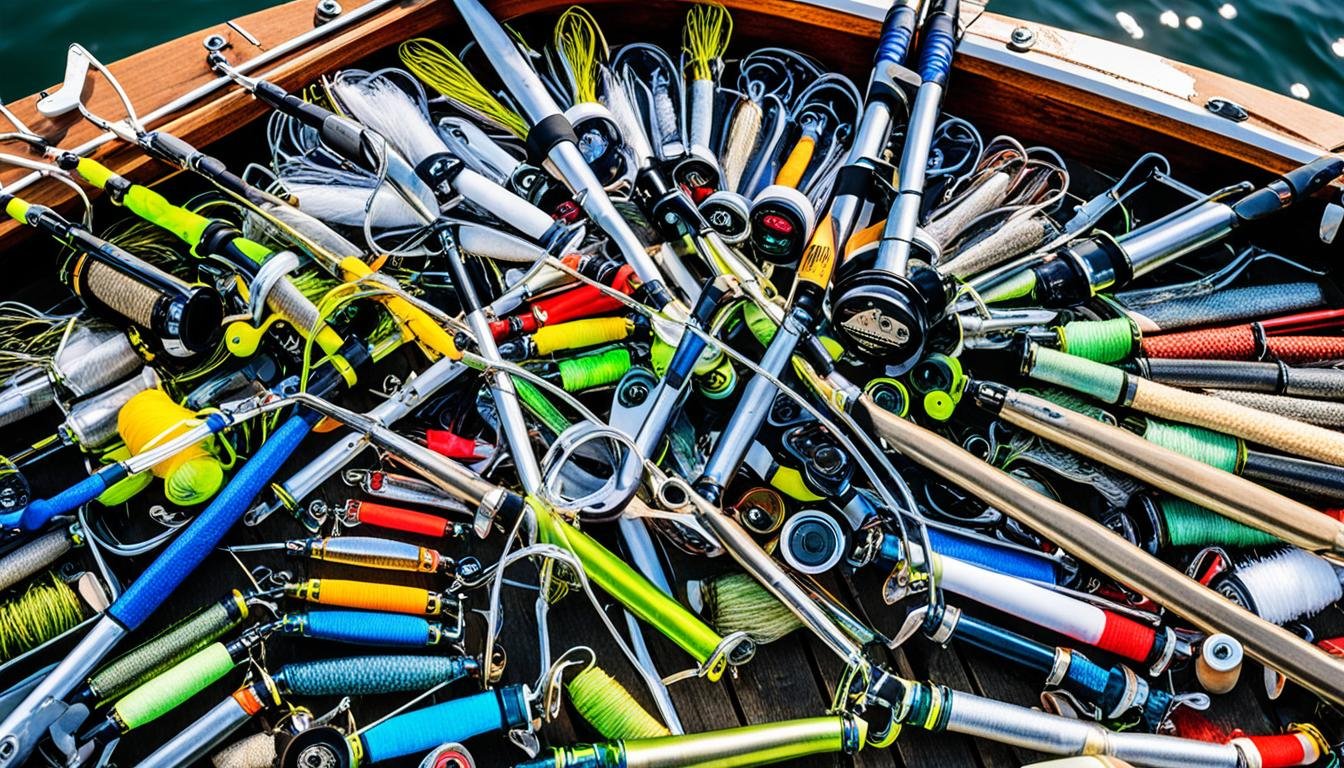Embark on an exhilarating angling adventure! Canada’s vast coastlines beckon anglers. With over 150,000 miles, it’s the world’s longest. From Pacific to Atlantic, pursue prized catches. Rockfish, lingcod, halibut, tuna, salmon varieties await.
This beginner’s guide equips you. Gain essential knowledge for successful saltwater fishing. Gear recommendations, techniques, regulations covered. Unlock memorable angling experiences in Canadian waters.
Key Takeaways about Saltwater Fishing in Canada
- Canada offers world-class saltwater fishing experiences along its extensive coastlines.
- Beginners can target a variety of prized fish species, including rockfish, lingcod, halibut, tuna, and salmon.
- Proper gear, techniques, and adherence to regulations are crucial for successful and responsible saltwater angling.
- This guide provides valuable insights and tips tailored for novice saltwater anglers in Canada.
- Saltwater fishing can be a thrilling and rewarding outdoor pursuit for anglers of all skill levels.
What is Saltwater Fishing?
Saltwater fishing is an exciting activity. It includes different types like inshore fishing and offshore fishing. Inshore fishing happens in bays, estuaries, and nearshore waters. Offshore fishing occurs in the open ocean.
This thrilling sport lets anglers target various saltwater fish species. Each species has unique traits and challenges.
Inshore vs Offshore Fishing
Inshore fishing takes place in coastal waters, bays, and estuaries. Anglers can target species like redfish, snook, spotted seatrout, and flounder. This type often involves smaller boats or shore-based tactics.
Offshore fishing happens in the open ocean, miles from the coastline. Here, anglers pursue larger pelagic species like tuna, marlin, and mahi-mahi. It requires larger boats capable of handling rougher conditions.
Common Saltwater Fish Species
Canadian waters have diverse saltwater fish species. Some sought-after ones are Atlantic cod, Pacific salmon, halibut, striped bass, and bluefin tuna.
Anglers can also target lingcod, rockfish, and bottom-dwelling fish. This depends on the region and season.
Proper species identification is crucial for responsible fishing practices. Familiarizing yourself with different species’ features enhances your experience and contributes to conservation.
| Species | Average Weight | Maximum Size |
|---|---|---|
| Chinook Salmon | 6 – 14 pounds | Up to 25 pounds |
| Pink Salmon | 4 – 6 pounds | – |
| Sockeye Salmon | Up to 15 pounds | 2 feet 9 inches |
| Lingcod | – | 60 inches, 130 pounds |
| Yelloweye Rockfish | – | 114 – 120 years (lifespan) |
Getting Started with Saltwater Fishing in Canada

To begin saltwater fishing in Canada, acquiring the right fishing gear is crucial. This activity demands specialized tackle built to withstand harsh marine conditions and handle powerful fish.
Essential Saltwater Fishing Gear
Your saltwater angling arsenal should include a sturdy fishing rod and reel combination suited for the sport’s demands. These essential tools ensure you’re prepared to target elusive, powerful fish species.
Choosing the Right Fishing Rod
Fishing rods for saltwater are typically longer, stiffer than freshwater rods. They have fast action, ample backbone to handle larger marine species’ power.
These robust rods withstand relentless battles when hooked into prized catches like hard-fighting salmon or massive halibut.
Selecting a Saltwater Fishing Reel
Complementing your saltwater rod is an equally crucial fishing reel. Saltwater reels must have reliable drag systems, corrosion-resistant materials, ample line capacity for powerful runs, sustained battles.
These reels endure harsh marine environments while providing performance to land trophy catches.
Beyond rod and reel, saltwater anglers rely on essential tackle like braided lines, circle hooks, weights, leaders. These components enhance presentation, increase hookup rates for triumphant fishing days.
| Essential Saltwater Tackle | Description |
|---|---|
| Braided Line | Offers superior strength, sensitivity for detecting strikes, battling powerful fish. |
| Circle Hooks | Hook fish in mouth corner, promoting catch-and-release practices. |
| Weights | Maintain bottom contact, achieve specific lure actions, presentations. |
| Leaders | Provide abrasion resistance, invisibility to avoid spooking wary species. |
Investing in proper saltwater gear equips you to conquer challenges, seize thrills defining exhilarating saltwater fishing in Canada’s bountiful coastal waters.
Saltwater Fishing in Canada: Best Locations

Canada’s vast coastlines offer prime fishing spots and coastal areas. These are considered prime locations for saltwater fishing enthusiasts. Both the Pacific and Atlantic coasts offer opportunities to target diverse saltwater species.
On the Pacific coast, British Columbia’s waters, including the Strait of Georgia and Vancouver Island, are renowned. Here, anglers can fish for salmon, halibut, and lingcod. The region has prime shore fishing spots like the 15053 Marine Drive pier in White Rock.
Other prime locations are the Jericho Sailing Centre pier in Vancouver, Ambleside Pier in North Vancouver, Ambleside Beach, and Capilano River mouth. From July to September, anglers can target Chinook, coho, and pink salmon in certain coastal areas.
In Atlantic Canada, Nova Scotia, New Brunswick, and Newfoundland and Labrador boast world-class fishing spots. Anglers can target Atlantic cod, striped bass, and bluefin tuna. Notable spots include the Gander River in Newfoundland (renowned for Atlantic Salmon fishing) and North Lake in Prince Edward Island (the Tuna Capital of the World).
Bras d’Or Lake in Nova Scotia, a UNESCO Biosphere Reserve, offers unique saltwater fishing in a protected environment.
The St. Lawrence River and Gulf of St. Lawrence are productive prime locations for saltwater anglers. These offer various fish species to target.
| Province | Notable Fishing Spots | Target Species |
|---|---|---|
| British Columbia | Strait of Georgia, Vancouver Island | Salmon, Halibut, Lingcod |
| Nova Scotia | Bras d’Or Lake | Various Saltwater Species |
| Newfoundland and Labrador | Gander River | Atlantic Salmon |
| Prince Edward Island | North Lake | Bluefin Tuna |
Whether experienced or a beginner, Canada’s coastal areas offer a wealth of fishing spots and prime locations. Explore and enjoy the thrill of saltwater fishing.
Saltwater Fishing Techniques
Anglers have various fishing methods for saltwater species. Each technique offers unique strategies and requirements. From natural baits to artificial lures or flies, choices are abundant.
Anglers can tailor their approach to different fish species and conditions.
Bait Fishing
Bait fishing presents live or cut bait to attract fish. This time-honored method involves bottom fishing or drift fishing. It requires understanding bait presentation.
Anglers must select the right bait, present it naturally, and adjust based on target species and conditions.
Lure Fishing
Lure fishing uses artificial lures like spoons, jigs, and plugs. These mimic baitfish to trigger strikes from predatory fish.
Lure selection is crucial, designed to imitate prey species’ movements and appearances. Anglers consider water depth, current, and fish behavior when choosing lures and retrieval techniques.
Fly Fishing
Saltwater fly fishing requires specialized gear and fly patterns. This technique targets species like bonefish, permit, and tarpon, often in shallow, clear waters.
Anglers must master presentation, mimicking small baitfish or crustaceans’ movements. This entices sharp-eyed predators.
Canada’s vast coastlines offer opportunities for anglers to explore diverse fishing methods, from British Columbia’s rugged shores to Nova Scotia and Newfoundland’s Atlantic waves.
| Game Fish Species | Technique | Peak Season | Max Weight |
|---|---|---|---|
| Chinook Salmon | Lure Fishing, Fly Fishing | May – October | 25 lbs |
| Coho Salmon | Bait Fishing, Lure Fishing | June – August | 25 lbs |
| Halibut | Bait Fishing | Spring – Fall | 400+ lbs |
| Lingcod | Bait Fishing, Lure Fishing | Year-round | 130 lbs |
Saltwater fishing in Canada offers diverse techniques to suit every angler’s preference and skill level. Whether pursuing gamefish or enjoying a peaceful day, there are options.
Saltwater Fishing in Canada: Regulations and Licenses
Saltwater fishing in Canada follows comprehensive regulations and licensing requirements. These measures promote conservation and sustainable fishing practices.
Anglers must obtain a valid fishing license before casting lines. Licenses can be purchased online or from vendors.
Fees vary based on residency, duration, and age. For example, B.C. resident licenses cost $22.59-$24.12 annually.
Non-residents pay $108.64-$116.02 for the same period.
| License Type | Resident Fee | Non-Resident Fee |
|---|---|---|
| 5-day (16+) | $17.21 | $32.35 |
| 3-day (16+) | $11.83 | $20.44 |
| 1-day (16+) | $5.66 | $7.53 |
Additional permits, like B.C.’s Salmon Conservation Stamp ($6.46), may be required.
Regulations protect populations and promote sustainability. These include catch limits, size restrictions, seasonal closures, and gear restrictions.
Non-residents fishing for halibut must purchase licenses from Independent Access Providers.
Refunds are not issued for purchased licenses, underscoring the importance of selecting the correct license option before completing the transaction.
Anglers must know and follow current regulations. This supports fish stock conservation and responsible resource management.
Saltwater Fishing Tips for Beginners
Saltwater fishing can be thrilling. For beginners, having the right advice ensures success and responsibility. Understanding tide patterns and currents is crucial, as they influence fish behavior.
Fish feed closer to shore during high tide. Low tide pushes them further out. Strong currents affect bait or lure presentation. Adjust your techniques accordingly.
Reading Tides and Currents
Tides and currents determine where fish congregate and when they’re most active. During high tide, many species move closer to shore, feeding in shallow waters. Low tide often pushes them further out.
Proper Fish Handling
Responsible angling involves proper fish care and handling techniques. Rubberized landing nets minimize harm. Avoid excessive air exposure. Practice catch-and-release by quickly removing the hook and returning fish gently.
If keeping your catch, follow best practices. Keep fish in the shade or on ice until ready to clean and prepare them.
- Use rubberized landing nets to minimize harm
- Avoid excessive air exposure
- Practice catch-and-release when appropriate
- Keep caught fish in the shade or on ice
Understanding tide patterns, currents, and proper fish handling increases chances of success and responsible saltwater fishing.
Saltwater Fishing Charters and Guides

Embark on an adventure with guided fishing trips or professional fishing charters. These outings provide an excellent opportunity for novice anglers or those exploring unfamiliar waters. Experienced fishing guides possess in-depth local knowledge of hotspots, techniques, and species.
This increases your chances of a successful and enjoyable fishing experience. In Campbell River, BC, renowned as the “Salmon Capital of the World,” Coastal Wilderness Adventures offers guided fishing trips. Their 25 to 28-foot covered and heated boats feature state-of-the-art electronics.
The professional guides specialize in various fishing methods like fly fishing, drift fishing, and downrigger fishing. They cater to different fish species and angler preferences.
With over two decades of experience fishing on BC’s west coast, Coastal Wilderness Adventures offers a unique opportunity to target all five species of Pacific salmon – Chinook, Coho, Pink, Sockeye, and Chum – as they migrate past Campbell River.
Beyond fishing expertise, charters provide necessary equipment and tackle, making them convenient for beginners or travelers without gear. These guided trips allow you to witness abundant wildlife like Killer Whales, Black Bears, Bald Eagles, Sea Lions, Sea Otters, marine birds, and Porpoises.
Explore pristine rivers, remote coastal passages, and majestic forests of Vancouver Island.
Saltwater Fishing Safety in Canada
Saltwater fishing in Canada’s coastal waters is exhilarating. However, prioritizing safety precautions is crucial. Unpredictable weather conditions pose risks.
Anglers must be prepared with appropriate attire. Essential gear like personal flotation devices is necessary. Communication devices are also vital.
Boating safety is another critical aspect. Regulations and guidelines ensure responsible vessel operation. Avoiding accidents or collisions is key.
Four out of five deaths on fishing vessels are related to stability issues like capsizing, foundering, or sinking, or from falling overboard.
The Fishing Vessel Safety Regulations address safety equipment. Safe operating procedures and vessel stability are covered. These regulations aim to enhance awareness among fish harvesters.
| Regulation | Key Provisions |
|---|---|
| Fishing Vessel Safety Regulations | Stability assessments, posting stability notices |
| Marine Personnel Regulations | Crew familiarity with equipment and duties |
| Collision Regulations | Vessel operation and collision avoidance |
| Prevention of Pollution from Ships | Environmental protection measures |
The Transportation Safety Board emphasizes crew familiarity with survival gear. Regular practice of emergency drills is crucial.
Marine Personnel Regulations make fishing vessel masters responsible. Ensuring crew readiness before voyages is vital.
- Understand local conditions and hazards
- Wear appropriate safety gear
- Follow boating regulations and guidelines
- Practice emergency procedures regularly
By prioritizing safety through preparation, awareness, and regulation adherence, anglers enjoy thrilling saltwater fishing responsibly.
Conclusion
Saltwater fishing in Canada offers an amazing opportunity. You can enjoy recreational fishing and outdoor adventures. These lead to personal growth.
Battling powerful fish is exhilarating. The coastal landscapes are serenely beautiful. This pursuit blends excitement, challenge, and self-discovery.
Following this beginner’s guide, you’ll feel confident. Discover new locations with aquatic life. Hone your angling skills and create lasting memories.
With preparation, respect for rules, and passion, saltwater fishing becomes lifelong. It opens doors to unforgettable outdoor adventures.
Casting into Canada’s vibrant waters engages thrilling fishing. You’ll forge a deeper nature connection. Embrace challenges, savor triumphs, enrich life.
FAQ about Saltwater Fishing in Canada
What is the difference between inshore and offshore saltwater fishing?
Inshore fishing occurs in bays, estuaries, and nearshore waters. It targets species like redfish, snook, and flounder.
Offshore fishing occurs in the open ocean. It pursues larger pelagic species like tuna, marlin, and mahi-mahi.
What are some essential saltwater fishing gear items?
Essential gear includes a sturdy rod and reel for marine environments, braided lines, circle hooks, weights, and leaders.
Saltwater rods are longer, stiffer, with more backbone to handle bigger fish.
Where are some prime locations for saltwater fishing in Canada?
On the Pacific coast, British Columbia’s waters like the Strait of Georgia and Vancouver Island offer salmon, halibut, and lingcod fishing.
In Atlantic Canada, Nova Scotia, New Brunswick, and Newfoundland and Labrador provide world-class fishing for Atlantic cod, striped bass, and bluefin tuna.
What are the different techniques used in saltwater fishing?
Common techniques include bait fishing (live or cut bait), lure fishing (artificial lures like spoons and jigs), and fly fishing (specialized flies).
Do I need a license for saltwater fishing in Canada?
Yes, anglers need a valid fishing license from authorized vendors. Regulations vary by region and species.
These may include catch limits, size restrictions, seasonal closures, and gear restrictions.
What are some tips for beginners in saltwater fishing?
Understand tide patterns and currents. Practice proper fish handling like rubberized landing nets and minimal air exposure.
Seek guidance from experienced anglers or join a local fishing club.
Should I consider hiring a fishing charter or guide?
Hiring a professional fishing charter or guide can be valuable, especially for beginners or exploring new areas.
Experienced captains and guides have extensive local knowledge, increasing chances of a successful fishing experience.
What safety precautions should I take when saltwater fishing in Canada?
Wear appropriate clothing and bring essential safety gear like PFDs and communication devices.
Familiarize yourself with local hazards, currents, and emergency procedures. Follow boating safety regulations.
Source Links
- https://www.discoverboating.com/resources/how-to-fish-beginner-fishing-tips
- https://www.pac.dfo-mpo.gc.ca/fm-gp/rec/licence-permis/index-eng.html
- https://www.peregrinelodge.com/fishing-adventures/saltwater-fishing/
- https://www.pac.dfo-mpo.gc.ca/fm-gp/rec/before-fishing-avant-peche-eng.html
- https://fishingbooker.com/blog/best-fishing-canada/
